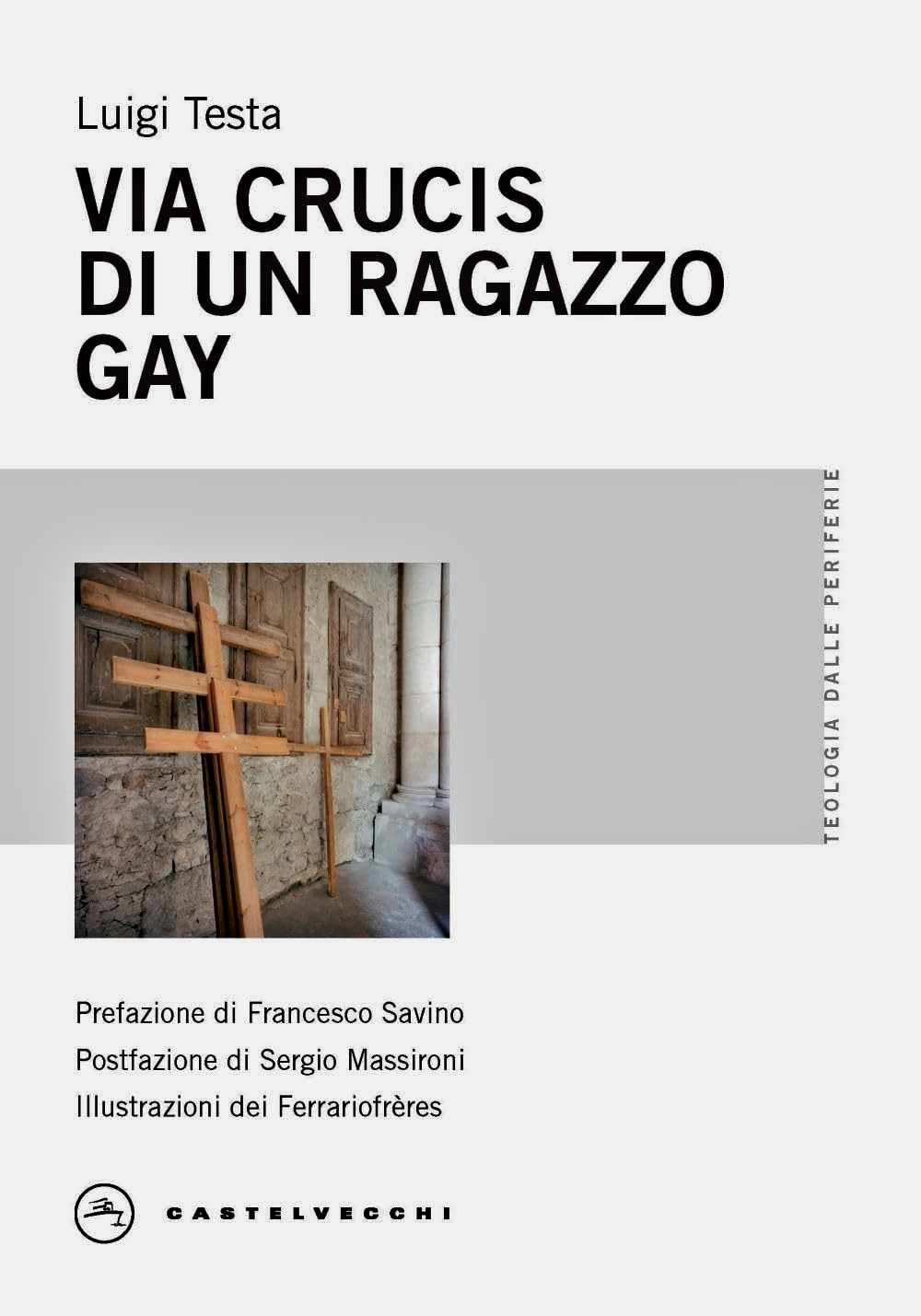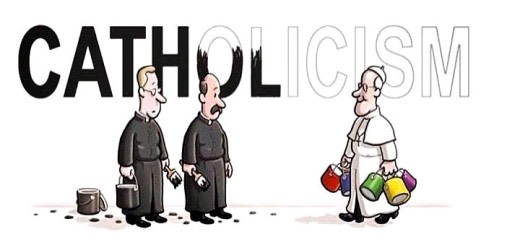The cross that remains on the skin
Intervention held by Mons. Francesco Savino, bishop of Cassano allajonio and vice president of the CEI, to Presentation of the book "Via Crucis of a gay boy" by Luigi Testa In the Parish of San Giuseppe in Rome on April 4, 202
There are existential plots that do not just tell a life, but expose it. Not for exhibitionism, nor for the need for consent, but out of inner necessity, by spiritual urgency. They are narratives that tear the canvas of the avisibility and decide to live the truth, whatever the price to pay. Via Crucis of a gay boy by Luigi Testa (Castelvecchi, 2024) is one of these reports of the soul: a way traveled not by imitation, but by liberation.
In this book there is no mask of stereotyped devotion, nor the alibi of a disengaged spirituality. Head takes the whole Christian tradition on himself - the language, the symbols, the wounds - and return it to the reader with a firm and powerful voice, without discounts and without veils. It is a word that comes from the wound, but that does not reduce to pain.
A word that seeks sense, redemption, light. The most radical gesture of the text is the choice not to hide anymore.
The author appoints his homosexuality and assumes it as an integral part of his spiritual journey. It does not present it as a temptation to fight, nor as a condition to bear, but as a secret breath of the soul, a living part of its deepest identity, which waits to be listened to, honored, welcomed.
This positioning, which may seem "simple" or even "obvious" in the eyes of those who live far from the ecclesial dimension, is in the Catholic Church an act of prophetic courage, especially in a context like the Italian one, where homosexuality lived Christianly is still often accompanied by silences, ambiguity, fears, inner compromises.
The stations of the Via Crucis then become the narrative device to tell a passion that is not only that of Christ, but also that of the young man who in the eyes of the others loves "in the wrong way": of the judged son, of the catechist who no longer welcomed, of the seminarian forced to the silent exit, of the faithful who sits every Sunday in the last bench of the church, fearing that his only presence can disturb the balance of the "accepted".
In the book, it is from the beginning that the author's breath becomes confession and wound: «I died inside many times too, Jesus, when a light word condemned me. When a betrayed confidence revealed me".
The pain does not come from a striking event, but from that slow daily acting that is consumed in the most intimate relationships, in the most familiar gestures.
Not even the condemnation needs clamor: just a look, a phrase letting fall, a kept preference. The cross, in this book, weighs with unspoken words, of the denied caresses, of the ambiguous homilies, of the blessings never granted.
It is the weight of a love that is continuously placed under an inquisition, but it is also - and here is the strength of the text - the space in which that same cross is transfigured.
Because the spirituality that emerges from these pages is wounded, yes, but not resigned. It is a wounded and tenacious faith, which has gone through the desert of abandonment, which has trembled at the thought of never being able to be embraced by God. But it is also a relying that has learned to listen to, resist, shout. An act of trust that claims the right to exist.
From a sociological point of view, Via Crucis of a gay boy It gives us back a profound and dramatically realistic portrait of the forms of marginalization that still cross the lives of LGBTQ+ people in religious and family contexts.
Luigi Testa tells without rhetoric about the internalized shame, the self -censorship learned, the sense of structural guilt that lurks in those who grow by feeling "output"In environments that make adhesion to the norm the assumption of love. That body had to become small, invisible, spiritually neutral so as not to disturb, not to disappoint, not to be" scandal ".
He tells it with a disarmed sweetness: "The first time I came out, Lord, it was to ask for help. [...] In all the coming out that followed, I felt more and more unloaded, increasingly lighter".
It is the language of those who have found the courage to appoint their most intimate truth, and in doing so he experienced not condemning it, but relief. As if to say it was already liberation, as if telling each other it was already salvation.
Among the most painful pages, the refusal that digs in the heart is the one lived inside the walls of the house. He writes Testa: «Those who feel judged, from the parents, feel chased away; Those who do not feel loved from the parents, put on their own on the road of these parents. [...] Put on the road and melt the incrustations of the hearts".
It is the cry of those who had to deal with the absence of a look of love, with the frost that insinuates themselves where hugs were expected. And faith, here too, does not save by running away: save crossing. But this Via Crucis does not stop at the inner labor.
The book is also a political act - in the highest sense of the term - because it claims the right to word, in the presence, to full existence. As when he writes, without artifices and without accusations: «Whenever someone tells me that I don't deserve, whenever someone wants me to convince me that I am wrong [...] your death on the cross is blasphemy".
It is in this fracture - between the sense of unworthiness and the cross as a refusal of every rule - that the spirituality of the head becomes more acute and revealing: its faith arises from the exact point in which love is denied.
It is a spirituality that asks for citizenship. A faith that does not want to be relegated to protected and silent spaces, but wants to be in the middle of the community, among others, with others, without its difference being perceived as an incineration of the order.
Here emerges a second level of reflection, more silent and as in the watermark of the text, but equally powerful: is the Church today capable of listening to stories like this? Is it still able to let yourself be interviewed not only by the doctrine, but by concrete bodies, from real tears, from the prayers that are born not from perfection, but from the wound?
Luigi does not ask for a formal blessing. He asks that his faith, and that of many like him, is not continuously made under examination. Claims that love is not tolerated, but recognized. That the spirituality of a homosexual person is not always an 'case' to be studied or correct, but one of the many deep and sincere ways, through which man starts on the way to the mystery.
He did it, with delicacy and tenacity, renovating the ties and even the pains at the cross. It is that love no longer conforms becomes a memory of redemption.
And in this sense Via Crucis of a gay boy It is one of the most authentic and necessary testimonies in the current panorama, because it dares to say what is often left on the margins: that even the broken, rejected, silenced lives are already within the Easter mystery. That even non -compliant bodies bring the signs of the resurrection into themselves.
The way in which he heads the via Crucis and his life experience returns a new, lighter, intimate access point, like a love garden that does not divide but unites. In a time when faith is often polarized, this is a theological and human lesson: shared pain can become a bridge, not a barrier.
And in the end, in the symbolic garden of the meeting found, head whispers words that seem to come from another life - or perhaps from the life that we all want: "Now that I have come to the end, keep me with you. [...] I will touch you, instead. I will hold you down. I will not move away, and we will remain together forever in the resurrection garden".
It is a last image of intimacy, no longer detained or guilty: love that can be said, that can be touched, that can remain. As if to say that even the penalty can find consolation, and that even those who have loved - and very suffered - can finally live in light.
This review is actually only the beginning of listening. At a certain point, the words of the critic must leave room for the sensitivity of the shepherd. And I do it, now, with humility and tremor.
I am a bishop. And as such I can't read Via Crucis of a gay boy Without feeling deeply asked. Not as a scholar, not only as a believer, but as a father and brother in faith.
The pages of the narrator touched me. Not because they tell something new, but because they have the courage to say aloud what many - too many - are forced to live in silence. It is not the truth of these lives that scare me, but our silence that makes them invisible.
For too many years we have talked about homosexuality, rarely with homosexual people. We have developed documents, pronounced homilies, built catechisms. But we have not always been able to listen. And listening is an act of courage: it is not enough to hear, it is necessary to let yourself be touched in the most vulnerable point.
Let yourself be reached deeply. Understand that behind every story like Luigi's there is a cry of dignity that can no longer be ignored, and a faith that - although not always finding home in the community - continues to look for God with poignant sincerity.
It is he himself to say with words that nail: "If I don't know how to love me, if I can't accept myself, if I don't know how to love myself, it's because I'm not stopping there, under the cross, while you look at me, and tell me:" It's for you "". It is an unarmed confession, but also a plea: that of those who seek a look that do not judge him, but bless him. That does not change it, but welcomes him.
This via Crucis is also ours. My. It is the way that runs through every Christian community when she chooses not to turn to the other side, when she lets itself destabilize the questions that emerge from the margins. When he is not afraid to get his hands dirty with real humanity.
As a bishop, I don't care to defend boundaries, but keep faces. And the face of those who love, believes, hopes and suffers cannot be kept out of the heart of the Church. It cannot be excluded from its blessings, nor from its inner liturgies. It is not a question of changing the doctrine, but of purifying the gaze. To return to that Jesus who has always chosen to be on the side of the injured bodies, despised hearts, denied stories.
The position of the Church on affectivity and sexuality, if it wants to be really evangelical, cannot be reduced to regulatory or moralistic formulas. It must start from the stories, the faces, the relationships. There is no Christian truth that can sprout if it is not grafted in listening to the concrete person, in his thirst for love and meaning.
Karl Rahner - for me the greatest Catholic theologian of the twentieth century - taught us that "the latest reality of man is his being an infinite question aimed at God". And if the human being is a question, research, tension towards you, then no emotional condition can be treated as an anomaly. Homosexuality is not a deviation from grace, but a place - often outraged - where grace can manifest itself, visit, save.
The painful and bright word of Henri Nouwen, a priest and psychologist, who has lived in silence his homosexuality while writing words of poignant humanity, echoes this vision: "Nobody can offer true hospitality if he has not known his inner desert".
The welcome of the other - especially when it is fragile, exposed, pushed into the shadows - is not an option for the Church, but it is its daily baptism. And it is right there, in the gesture that does not judge but embraces, that the similarity with the God who has taken meat within our limits is manifested. For this reason, I believe, with profound conviction, that true orthodoxy is not rigidity, but intelligent compassion.
Moral teaching cannot become a tool to oppress those who already carry the weight of the refusal on themselves. If we want to be a church, then we must learn to look at not only to the compliance of a love for the norm, but to his fidelity to the truth of a person who seeks God with all of himself. And when it is so, perhaps we are already on the sacred ground of the meeting.
Love, every love that arises from respect and feeds on a gift, is getting closer to the Gospel than we think. And perhaps, if we returned to look at every story as a theological place, we would discover that God has lived for a long time in the hearts that we had excluded. In this light, homosexuality is not a waste of creation, but a form of existence that asks for listening, accompaniment, recognition. The Church must not be afraid of walking next to those who love. It is not a question of denying tradition, but of letting it evolve into the folds of mercy.
Every time we stiffened on moral categories, we stopped seeing the faces. Every time we talked about the other instead of the other, we betrayed the Gospel of the meeting.
And then today, more than ever, I feel that the first theological act of the Church is the embrace. The second is listening. The third is the adoring silence in front of the mystery of the other.
The rest - the doctrine, the documents, the rules - comes later. Because first of all the person comes. And in each person he lives a fragment of the face of God.
Luigi Testa's book gives us a question that we cannot evade: will we be able to build a church that is not afraid of love? I want to hope for yes. And I want to do it starting from this gesture of testimony that does not judge, but offers. That does not demand, but gives itself. A testimony that asks us only to stay, not to escape, to accompany. To finally be that house where no one should feel more passing, but a loved son.
That this via Crucis can become, for all of us, a way of light. And that the promised resurrection is not only for tomorrow, but begins - with concrete gestures - today.
Because love, when it is authentic, is always a gesture of Nardo paid: "broken, scattered, wasted", writes the afterword. The audacity of the spiritual protagonist of the text is all here: "Touch, unge, caress, does not explain".
And perhaps this is the tenderness that the Church has yet to learn: the one that is not afraid of the body, of intimacy, of the perfume that remains on the skin.







